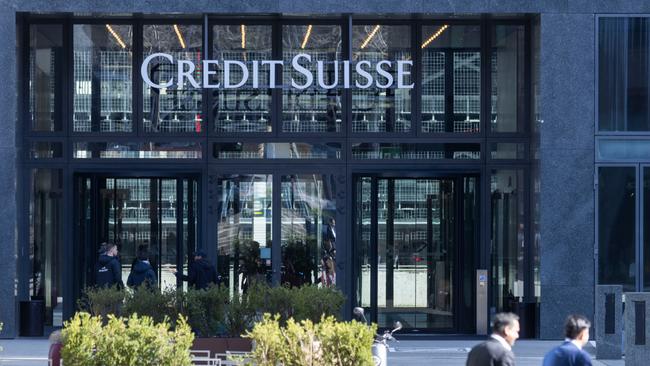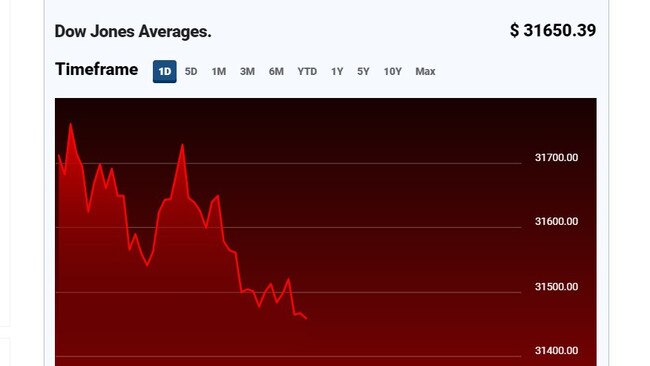Credit Suisse stock price jumps as bank secures $75bn lifeline
Credit Suisse’s share price rebounded after its Swiss National Bank rescue, but experts are still wary on the bank’s prospects.

Credit Suisse shares jumped after the bank said it would tap a more than $US50 billion ($75 million) lifeline from the Swiss National Bank, but analysts remained wary about the lender’s prospects.
Investor confidence in the Swiss bank deteriorated rapidly this week, after investors turned their attention to the struggling lender following the collapse of two large banks in the U.S.
The sudden evaporation of support from markets prompted the SNB, Switzerland’s central bank, to offer rescue funds on Wednesday night (local time). Credit Suisse called its use of the lending facility a “decisive action to pre-emptively strengthen its liquidity.” It posted what it called high-quality assets to the SNB as collateral to back up the loans.
Credit Suisse shares traded in Zurich ended up 19 per cent last night after the bank announced it would tap the financing. Some Credit Suisse bonds also rose, though they didn’t regain all the lost ground from the previous day’s plunge.
The prices on credit-default swaps, which insure against a possible Credit Suisse default, remained at high levels. Such signals have prompted some Credit Suisse clients to pause trades with the bank in recent days, according to people familiar with the matter.
Investors and analysts said the liquidity line would buy Credit Suisse and regulators time to find longer-term solutions, which could include a breakup or sale of major parts of the bank.
The SNB statement specified that it was helping the “globally active bank,” a signal to some that it was willing to stand behind Credit Suisse’s foreign operations, which are considered troubled in comparison with its more solid Swiss business.
“M&A is increasingly likely, and the SNB statement that it will provide liquidity to the global bank makes Credit Suisse’s operations more attractive to a buyer,” said Jérôme Legras, head of research at Axiom Alternative Investments.

Seeking to set itself apart from SVB Financial Corp., the parent of Silicon Valley Bank, which failed last week following the flight of a quarter of its deposit base in a single day, Credit Suisse said it “is conservatively positioned against interest rate risks.” Unlike SVB, which held a large, mostly unhedged portfolio of long-term bonds whose market value was decimated by rising interest rates, Credit Suisse said its “volume of duration fixed income securities is not material” relative to its holdings of high-quality liquid assets such as Treasurys and German bunds. The bank said it “is fully hedged for moves in interest rates.” The extra money from the SNB is meant to reassure customers and other banks that do business with Credit Suisse that it has ample funds on hand.
The bank suffered massive outflows of customer deposits in recent months that had failed to reverse. Nevertheless, the bank said it has maintained key capital ratios and had ample backup cash.
Its average liquidity coverage ratio, a measure of liquid assets it has on hand for customers withdrawing cash in times of stress, had improved to 150 per cent on March 14 from 144 per cent at the end of the year. The use of the SNB facility will add to that buffer, the bank said.
Credit Suisse also said it would buy back some debt securities in a bid to reduce interest expense and take advantage of the depressed prices of many of its bonds. The firm said tender offers would cover 10 senior US dollar bonds worth $US2.5bn and four senior euro bonds worth EUR500 million, or about $US530m.
Analysts have been calculating the value of some units Credit Suisse could try to sell quickly. Credit Suisse’s main wealth-management business serving rich customers across the world is potentially worth around $US10bn, though continuing customer outflows mean it might not fetch that much, according to Thomas Hallett, a banks analyst at Stifel Financial Corp. unit KBW. Credit Suisse’s asset-management arm, which operates investment funds, would also be an attractive target.

Mr. Hallett said Credit Suisse’s Swiss arm, where it operates one of the country’s leading domestic banks, could be worth around $US13bn, well above the entire bank’s market value, which stands at around $US6.5bn.
Its investment bank, which makes up much of its foreign operations, has a negative value of close to $US12bn in his calculations, given high costs and a sharply deteriorated business model that is likely to throw off losses for some time.
JPMorgan analysts in a note Thursday said a partial nationalization, a breakup or a merger were possible solutions. It added that while the Swiss bank doesn’t have a capital problem, it faces market-confidence issues. “In our view, status quo is no longer an option.” The 166-year-old bank is one of Switzerland’s crown jewels. Along with crosstown rival UBS Group AG, the two banks form a powerful duo with large global footprints helping to manage the cash of rich people around the world.
But Credit Suisse has endured what to investors has felt like an unending cycle of missteps and mishaps. Clients Greensill Capital and Archegos Capital Management blew up in 2021. A chairman who pledged to right the ship was ousted for breaking Covid-lockdown rules. The bank, under new management, raised $4 billion in fresh capital from investors last fall, but failed to dissuade customers from withdrawing investment assets and deposits.
The problems snowballed this week. Credit Suisse said Tuesday in its annual report that it had identified “material weaknesses” in its internal controls over financial reporting. While the deficiencies didn’t alter its financial reports, they underscored the skeptical view many investors have on the bank.
Strictly by the numbers, Credit Suisse’s predicament appears to have been driven by dimming prospects for future profits, as opposed to a big hole in its balance sheet that the company itself has flagged to investors, as was the case with Silicon Valley Bank.
Credit Suisse’s most recent loss resulted not from credit losses, due to loans going bad, which were tiny last year. Instead, the losses were driven by a business whose underlying business model was struggling. It suffered a one-third decline in revenue last year, caused by sharply lower commissions and fees as customers withdrew money.
There was also a 3.7 billion franc, equivalent to $US3.96bn, charge to earnings during the third quarter to write down almost all of Credit Suisse’s deferred-tax assets.
The tax-asset write-down signaled that Credit Suisse’s future earnings outlook was bleak. Such assets consist of tax-deductible losses and expenses carried forward from prior years, which can be used to offset future income-tax bills.
They are valuable only to companies that are profitable and paying income taxes. Credit Suisse has said it doesn’t expect to turn a profit again for 2023.
The Wall Street Journal







To join the conversation, please log in. Don't have an account? Register
Join the conversation, you are commenting as Logout